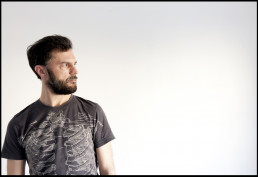“A GRANDE DÍVIDA”
Rui Catalão
A Grande Dívida é um ciclo de conferências em que as mais improváveis formas de endividamento são abordadas.
É uma paródia aos estudos performativos, com um artista de palco no lugar do conferencista: cada tema é apresentado e desenvolvido, há uma conclusão e uma sessão de perguntas e respostas. É uma série de atos performativos em que a vida contemporânea é analisada, recorrendo a referências mais antigas. É teatro sem aparato cénico: apenas o prazer de contar histórias, de explorar as diversas dimensões do corpo humano e de usar a memória para refletir sobre o presente como se apresenta.
A GRANDE ILUSÃO (de Sofia Dinger)
Em 2014, colaborei durante dois meses com a atriz Sofia Dinger, para a sua peça A Grande Ilusão. Uma semana antes da data de estreia no Teatro Maria Matos, Sofia Dinger cancelou a apresentação da peça. No processo, em que se estabeleceu um diálogo com a obra escrita e filmada de Jean Renoir, foram testadas 5 versões. A partir deste fracasso, tentarei abordar a “maldição” dos trabalhos que não se deixam fazer, procurando também explorar o que é isso de um trabalho “acabado” e o que é isso de um trabalho “inacabado”, no contexto bem subjetivo da produção artística. A “questão do prazo”, dos “custos de produção”, dos “valores de classe” e do “fator X” ajudar-me-ão certamente a ser entendido…
A ROSA E O SINO
Em “A Rosa de Paracelso”, pequeno conto da velhice de Jorge Luís Borges, as preces do grande mestre alquímico são escutadas, e ele é visitado por um estranho que se oferece para tornar-se seu aprendiz. Mas o pretendente exige uma prova de que Paracelso é um verdadeiro mestre e Paracelso exige-lhe o caminho da fé. Uma rosa é atirada ao fogo. Se Paracelso fizer ressurgir a rosa das cinzas, é porque os seus conhecimentos são verdadeiros. Mas se levar a demonstração avante confirma-se que o discípulo não é merecedor dos seus conhecimentos e Paracelso hesita em abrir a mão que contém as cinzas ou a rosa.
No último episódio do filme Andrei Rubliov, de A. Tarkovsky, o jovem Andriocha, filho de um mestre sineiro, convence um cliente que o seu pai lhe ensinou o ofício de construir sinos antes de morrer. O sino é construído com grande sucesso, mas no final ficamos a saber que o pai de Andriocha nunca lhe ensinou o segredo de construir sinos.
A partir destas duas histórias sobre a fé, pretendo explorar o mistério do conhecimento, da experiência, e de como resolver problemas para os quais se desconhecem soluções.
CONQUISTA DE CEUTA
Para financiar os meus estudos, nos anos 80, ainda com as fronteiras a separarem os países europeus, a minha mãe, operária, começou a fazer viagens de negócios a Ceuta, fazendo contrabando de produtos que comprava no norte de África para depois vender às colegas em Portugal. A partir do relato de algumas das aventuras que partilhei com ela, A conquista de Ceuta, é também um regresso à História de Portugal, com o início da expansão marítima (iniciada exatamente em Ceuta), quando Portugal deixou de ser uma pequena nação e começou a descobrir novos horizontes fora da Europa.
A DÍVIDA FAMILIAR
Em 2003, descobri uma fotografia de um filho no momento do seu pai ser enterrado, na sequência de um terramoto. Essa fotografia deu origem à escrita de um romance que não cheguei a acabar, A dívida. Esse romance resultou de uma negociação com o meu pai: ele deixar-me ficar na casa da minha avó paterna até eu acabar de escrevê-lo. Onze anos depois, o objetivo desta apresentação é contar, à frente do público, a verdadeira história desse romance, que é também a história de uma dívida para com a minha família, pela forma como apoiaram a minha atividade artística. Esse romance é também a história de uma geração que vive ainda dependente financeiramente da família; do seu modo de vida sem correspondência com o mercado de trabalho. É ainda a história de uma geração que tarda em confrontar-se com a realidade, em comparação com as suas expectativas e os objetivos que definiu para si.
Ficha técnica
Criação e Interpretação Rui Catalão
Assistência técnica (imagem) Urândia Aragão
Produção Produções Independentes, Tânia M. Guerreiro
Apoio Fundação Calouste Gulbenkian
“A GRANDE DÍVIDA”
Rui Catalão
The Great Debt is a series of conferences in which the most unlikely forms of debt are addressed.
It’s a parody on performative studies, with a stage performer in place of a lecturer: each theme is presented and developed; there is a conclusion and a Q&A session. It is a series of performative acts in which contemporary life is analysed, using older references. It’s theatre without a scenic apparatus: only the pleasure of storytelling, to explore the various dimensions of the human body and to use memory to reflect on the present as it presents itself.
THE GREAT ILLUSION (by Sofia Dinger)
In 2014, I worked for two months with the actress Sofia Dinger, for her play The Great Illusion. A week before the premiere date at Maria Matos Theatre, Sofia Dinger cancelled the play. In the process, in which a dialogue was established with the written and filmed work of Jean Renoir, 5 versions were tested. From this failure, I will try to address the “curse” of the works that are not allowed to do, as trying to explore what is this of a “finished” and “unfinished” work in the very subjective context of artistic production. The “issue of time”, “production costs”, “class values” and “X-factor” will certainly help me to understand…
THE ROSE AND THE BELL
In The Rose of Paracelsus (La Rosa de Paracelso), a short story that Jorge Luis Borges wrote in the final years of his life, the prayers of the great alchemical master are heard, and he is visited by a stranger who offers to become his apprentice. But the applicant requires proof that Paracelsus is a true master and Paracelsus demands from the disciple the way of faith. A rose is thrown into the fire. If Paracelsus resurrects the rose from the ashes, he is proved as a true master, but this will also confirm that the disciple is not worthy of his knowledge and Paracelsus hesitates to open the hand containing the ashes or the rose.
In the last episode of the film Andrei Rubliov by A. Tarkovsky, Andriocha, the young son of a master bell ringer, convinces a customer that his father taught him the craft of building bells before his death. The bell is built with great success, but in the end, we learn that Andriocha’s father never taught him the secret of building bells.
From these two stories about faith, I intend to explore the mystery of knowledge, experience, and how to solve problems for which solutions are unknown.
THE CONQUEST OF CEUTA
To finance my studies in the 80s, with the borders still separating the European countries, my mother, a worker, started making business trips to Ceuta, smuggling products purchased in North Africa to sold them to her colleagues in Portugal. Based on the account of some of the adventures we shared, The Conquest of Ceuta, is also a return to the History of Portugal, with the beginning of maritime expansion (which started exactly in Ceuta), when Portugal stopped being a small nation and began to discover new horizons outside Europe.
THE FAMILY DEBT
In 2003, I found a photograph of a child taken at the moment of the burial of his father as a result of an earthquake. This picture led to the writing of a novel that I did not manage to complete, The debt. This novel resulted from a negotiation with my father: he would let me stay in the house of my paternal grandmother until I finish writing it. Eleven years later, the aim of this presentation is to tell, in public, the real story of this novel, which is also the story of a debt to my family about the way they supported my artistic activity. This novel is also about the story of a generation that is still financially dependent of their family; of their way of life that does not match the labour market. It is also the story of a generation that confronts its reality only later, compared with its expectations and the goals it set for itself.
Credits
Concept and Performance Rui Catalão
Technical assistance (image) Urândia Aragão
Production Produções Independentes, Tânia M. Guerreiro
Support Fundação Calouste Gulbenkian


